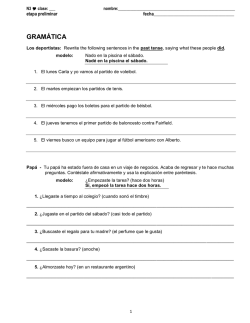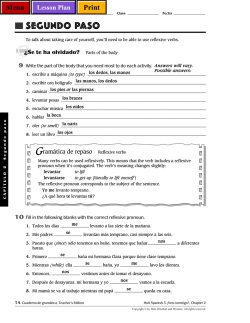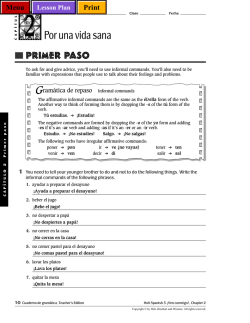
Finasteride ^ Finasteride Tablets 1mg, Finpecia Finasteride Tablets
Menu Lesson Plan Nombre Print Clase Fecha SEGUNDO PASO To talk about future events, you’ll need to use the future tense. G ramática The future tense The future tense is formed by taking the future stem and adding the future endings: -é, -ás, -á, -emos, -án. The infinitive serves as the future stem for all verbs except those listed on page 79 of your textbook. Beyond those irregular verbs, there are no other stem changes in the future tense. yo dormiré nosotros dormiremos tú dormirás vosotros dormiréis él / ella / Ud. dormirá ellos / ellas / Uds. dormirán 12 Complete the sentences with the correct future form of the verbs in parentheses. saldrá 1. El tren (salir) mañana a las dos de la tarde. llegará 2. Mi primo (llegar) a San Antonio a las cuatro y media. estarán 3. Todos nuestros familiares (estar) muy contentos de vernos. iremos 4. En San Antonio mis primos y yo (ir) a muchos lugares turísticos. te divertirás 5. Si tú vienes con nosotros, (divertirse). vendrán 6. Mis abuelos (venir) a San Antonio también. se pondrán 7. Ellos también (ponerse) muy contentos. Habrá 8. (haber) mucho que hacer allí en San Antonio. CAPÍTULO 3 Segundo paso 13 Margo is thinking about what her future will be like. For each phrase, write a question using the future tense of the verb in parentheses. MODELO my future career (dedicarse) ¿A qué me dedicaré? ¿Adónde podré viajar? 1. where I’ll be able to travel (poder) ¿A qué universidad asistiré? 2. what university I’ll go to (asistir) ¿Dónde conoceré a nuevos amigos? 3. where I’ll meet new friends (conocer) estudiarán mis amigos? 4. what my friends will study (estudiar) ¿Qué ¿Quiénes serán mis profesores? 5. who my professors will be (ser) ¿Dónde viviré? 6. where I’ll live (vivir) ¿Cuántos hijos tendré? 7. number of children I will have (tener) 24 Cuaderno de gramática, Teacher’s Edition Holt Spanish 3 ¡Ven conmigo!, Chapter 3 Copyright © by Holt, Rinehart and Winston. All rights reserved. Menu Lesson Plan Nombre 14 Print Clase Fecha Matilde was working on the following report for her social studies class about the future. Fill in the blanks with the correct future tense form of the verb in parentheses. habrá En el futuro (1) (haber) muchos cambios y el mundo del futuro será (2) (ser) muy distinto al de hoy. Por ejemplo, la computadora tendrá (3) (tener) un lugar aún más importante. Hoy usamos mucho usaremos las computadoras, pero en el futuro las (4) (usar) más. El uso de la cambiará computadora (5) (cambiar) la manera en que nos comunicamos. Nosotros hablaremos (6) (hablar) tanto por computadora como por teléfono y hasta las noticias las leeremos (7) (leer) por la computadora. tendrá Otro cambio (8) (tener) lugar en el transporte. En el futuro la gente manejará contaminarán (contaminar) (9) (manejar) carros eléctricos que no (10) tomará (tomar) más el autobús y otras formas de transporte el aire. También se (11) habrá público. De esta manera no (12) (haber) tanta contaminación como hoy. cambiará Es cierto que nuestra vida diaria (13) (cambiar) en el futuro. Tenemos estaremos que prepararnos para estos cambios. De esta manera (14) (estar) listos cuando lleguen. 15 Write a sentence saying what you think will probably happen to each person or what they will probably do next. Answers will vary. Possible answers: 1. María estudió por tres horas. Está muy cansada. Entonces . . . descansará. 2. Sé que tú no has comido nada hoy. Acabas de salir de tu última clase. Entonces probablemente . . . comerás. 3. Hace mucho calor hoy y Julia está corriendo. Cuando llegue a casa . . . 4. Alejandro suspendió el examen de química. La próxima vez . . . estudiará más. 5. Necesito más dinero para asistir a la universidad. Este verano . . . buscaré un trabajo. 6. Está muy nublado hoy. Pronosticaron (They forecast) lluvia así que dentro de un rato . . . 7. Felipe está muy aburrido hoy. Pero lo invitaron sus amigos a salir así que . . . saldrá. 8. A Sandra le encanta la Argentina. Algún día . . . vivirá allí. Holt Spanish 3 ¡Ven conmigo!, Chapter 3 Copyright © by Holt, Rinehart and Winston. All rights reserved. Cuaderno de gramática, Teacher’s Edition 25 Segundo paso lloverá. CAPÍTULO 3 tomará agua. Menu Print Lesson Plan Nombre Clase Fecha ? ¿Te acuerdas? más . . . que menos . . . que 16 Making comparisons more . . . than less . . . than tan . . . como tanto(os/a/as) . . . como as . . . as as much (many) . . . as Alani has taken an informal survey about how many things people in her class have done. Complete the sentences below according to the chart. Fill in the first blank with más, menos, or the correct form of tanto, and the second with either que or como. Amanda Robertín Chen Ángelo Kirk Jodi películas 22 21 4 3 9 12 ciudades 1 1 1 3 2 5 comidas 3 9 2 1 1 10 fiestas 2 2 4 1 2 3 más que 1. Amanda ha visto películas Chen. tantas como 2. Robertín ha viajado a ciudades Amanda. tantas como 3. Kirk ha ido a fiestas Amanda. que más 4. Jodi ha probado (tasted) comidas Kirk. que menos 5. Jodi ha visto películas Robertín. que menos 6. Chen ha ido a ciudades Kirk. 17 Use the following cues to write complete logical sentences. You will need to add más, menos, the correct form of tanto, and either que or como. MODELO enero / tener / días / febrero Enero tiene más días que febrero. CAPÍTULO 3 Segundo paso 1. una pizza / tener / calorías / una manzana La pizza tiene más calorías que la manzana. 2. un siglo / tener / años / una década (decade) El siglo tiene más años que la década. 3. el carro / tener / ruedas / la bicicleta El carro tiene más ruedas que la bicicleta. 4. el perro / tener / piernas / el gato El perro tiene tantas piernas como el gato. 5. el lago / ser / grande / el océano El lago es menos grande que el océano. 26 Cuaderno de gramática, Teacher’s Edition Holt Spanish 3 ¡Ven conmigo!, Chapter 3 Copyright © by Holt, Rinehart and Winston. All rights reserved. Menu Print Lesson Plan Nombre Clase Fecha ? ¿Te acuerdas? 18 Vamos ainfinitive Javier is trying to get his friends to do things with him. What do you think Javier would say to his friends to get them to all go together? Use vamos ainfinitive. Answers will vary. Possible answers: 1. Tengo hambre. Vamos a comer. 2. Hay una nueva película en el cine. Vamos a ver la nueva película al cine. 3. Hace muy buen tiempo hoy y hay mucha gente en el parque. Vamos a dar un paseo al parque. 4. Hace sol y la piscina está abierta. Vamos a nadar. 5. Aprendí un baile nuevo. Vamos a bailar. 6. Tenemos un examen de química muy difícil. Vamos a estudiar. VOCABULARIO 19 El futuro The following is an excerpt from this month’s issue of El mañana magazine. Fill in the blanks with an appropriate word from the word box. Conjugate any verbs as necessary. botar carros eléc tricos destruir desarrollar solar energía porvenir mejorar Copyright © by Holt, Rinehart and Winston. All rights reserved. Cuaderno de gramática, Teacher’s Edition Segundo paso Holt Spanish 3 ¡Ven conmigo!, Chapter 3 CAPÍTULO 3 En el mundo de hoy, la tecnología ha caus ado muchos problema tenemos que resolver. s que todavía Tal vez el problema má s grave sea el de la co nta minación. De todos modos, hay mu cho que podemos hacer para (1) mejorar la situación. En primer lugar, podemos (2) de sa rro lla r nuevas formas de energía. La (3) en er gía so lar , por ejemplo, es un a forma de energía muy limpia que no (4 de str e ) uy el medio sol vivirá por muchos ambiente. Y además el años más. Otra cosa que podemos hacer es comenzar a manejar s elé (5) ca ctr ico rro s . También nos toca reciclar la basura. Hasta ahora hemos (6) botado mu cha basura. 27
© Copyright 2026


